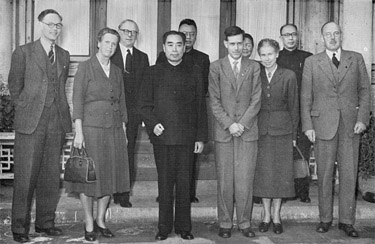
The China Convoy's Duncan Wood (third right front) and fellow former-FAU member Grigor McClelland (far left) meet Chou En Lai with a Quaker delegation to China in 1955
Many returned with an appreciation for the Chinese perspective in world affairs and sought thereafter to foster dialogue and understanding with Communist China. A Quaker delegation including FAU members Duncan Wood and Grigor McClelland was received by Chou En Lai in 1955. Later both Duncan and Sydney Bailey were active in promoting admission of the People’s Republic of China to the UN Security Council.
Many members determined to continue to be active in humanitarian service and relief, including Michael Harris, Bernard Llewellyn and Chris Barber with Oxfam, and Andrew Braid, Brian Jones and others in various branches of the UN. Others became doctors and teachers and many were active in the public services. Most retained their pacifist convictions and their concerns to alleviate the suffering of others, including those who supported the Laurie Baker Society’s charitable work in India. All seemed to have gained a new perspective on suffering and privation and a revised sense of their values.
Perhaps their most striking legacy was that of the bonds of fellowship they shared having lived together in extraordinary circumstances. This fellowship included the handful of members who for different reasons and in different circumstances had chosen to leave the FAU to take up service in the armed forces. This fellowship endures today amongst the dwindling band of surviving original members and is continued by the sons and daughters of many who served in the China Convoy.

 FAU China Convoy Reunion Group
FAU China Convoy Reunion Group